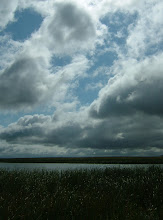
It has been suggested that humans are inherently warlike and that our future as a species will always include war. Some agree with me by saying "Yes, there will always be evil in the world that we will need to fight." But is war ever an answer to any evil? Or is it just a counter-evil? Are there other options? Are there always other options? Do we seek hard enough for options?

I listen to popular music and look around at society and what we do with our time and what we value and how we motivate ourselves and what we care about, and I am left agreeing that yes, humans have an insatiable desire for conflict that will always lead to war somewhere and at some time. I don't like that answer, but I can find nothing to justify any other opinion.

We love to rally ourselves together into a larger force and that rallying usually, in order to be FOR something, needs to be AGAINST something else. We are not just FOR a cleaner environment, we are AGAINST big oil and cancer causing chemicals and litter and suburban sprawl. We are not just FOR better health, we are AGAINST cancer and influenza and mental illness. We cheer on sports teams even more energetically if they are battling a long time rival that we can be clearly against. The more succinctly we can put a label and a cause on the thing we are against, the happier we are and the more 'good' we think we have done against it ant its 'evil'.

We love to have heroes and heroes have to have a foe and that foe has to come from within an enemy camp. Sure we can have a teacher as a hero, but often even that hero is most known for fighting AGAINST something like gangs in the school or a certain learning disability as opposed to just teaching more and better.

We tried team building in corporations but if the team was FOR a better product, the concept did little to motivate. If the team was placed in opposition to come competitor outside company, or if internal teams could be challenged to excel in come metric against internal teams, the concept lead to harder work and better quality. The 'enemy' had to be in place for the team to rally!

We love to insist that there is a 'force' of 'evil', but often the things we describe as evil are just the same things we do or reward in others. The Muslim terror bomber is giving their life for their God that wants them to act out against what they perceive is an evil of a world gone too materialistic, i.e. US, and yet, we see THEM as evil. At the same time, we revere the 'good' saints who give their lives literally as martyrs for their god or give their lives over to the service to their god. Maybe there is not evil at all, but just an exaggeration and perversion of normal human desires to accumulate goods, to accumulate territory, to protect turf, to protect family. The desire for power in the business world or in a service organization is called ambition and drive and is regarded as a good thing, but the desire for power in some sort of anti-government group is given other labels. But when the same mechanism is at work for something we do not agree with, how can it be called evil when it is admired in another context?

It is easy to think of a world divided by good and evil, but it is more difficult to accept that maybe the person we label evil is doing the same things we are but due to different motivations. It is easy to bomb and shoot, but it is more difficult to find ways that we can peacefully coexist over mutually desired outcomes. Can we find ways to convince the 'enemy' to disengage in behaviors we don't like by finding motivations for other behaviors?

When you get right down to it, most forces we call 'evil' are doing what they are doing for reasons that look and sound a lot like ours, to improve a situation for their people, their families, to glorify or defend their god. In fact, sometimes, they see us as the force of 'evil'. It hardly seems like violence is the answer in that case and it hardly seems like there will or even should be a clear 'winner'. Perhaps tolerance and conversation and more tolerance and more conversation would lead to a discovery of more in common with each other and less judging and labelling?
We somehow think our bombing and shooting is 'good' but can it ever really be?
Peace is hard work and I am frankly not sure we as humans really want it. We love a cause, we love our heroes, we love to have an enemy, we love to have things we can label 'evil' in contrast to the 'good' that we believe we possess and which possesses us.
Maybe if we ADMIT we love our war, then we can work harder to not use it? If we keep insisting we hate war, will we just keep allowing ourselves to justify using it in yet another 'exceptional' case, this one last time.
Do we indeed love war, and at what cost? Young lives lost, young bodies mutilated, young minds scarred. What will it take to make our love of the cause, the hero, the glory of victory, be outweighed by the love of our own individual people? What will make us give up our warring human ways?




















